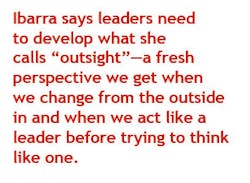To help with this change, says Ibarra, she recommends taking these steps:
- Be more playful with your own identity to stretch beyond your current self-concept.
- Let go of performance goals that can diminish how much we're willing to risk in the service of learning.
- Don't stick to your story. Try different versions, narrate different defining moments and keep editing as you would your CV.
- Allocate less time to what you do best to devote more time to learning other things that are also important.
- Create and use networks to tap new ideas, connect to people in different worlds and access radically different perspectives.
By implementing these changes, Ibarra maintains you'll then let go of old habits and sources of self-esteem that define your current limits. The more you experiment with acting like a leader, she concludes, the more you and others will perceive you as one.
About the Author
Steve Minter
Steve Minter, Executive Editor
Focus: Leadership, Global Economy, Energy
Call: 216-931-9281
Follow on Twitter: @SgMinterIW
An award-winning editor, Executive Editor Steve Minter covers leadership, global economic and trade issues and energy, tackling subject matter ranging from CEO profiles and leadership theories to economic trends and energy policy. As well, he supervises content development for editorial products including the magazine, IndustryWeek.com, research and information products, and conferences.
Before joining the IW staff, Steve was publisher and editorial director of Penton Media’s EHS Today, where he was instrumental in the development of the Champions of Safety and America’s Safest Companies recognition programs.
Steve received his B.A. in English from Oberlin College. He is married and has two adult children.

